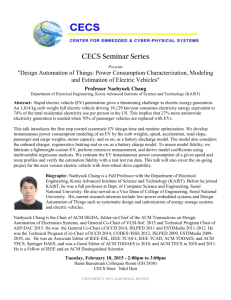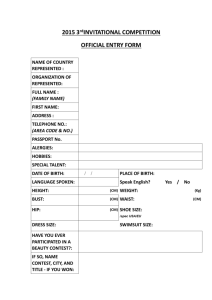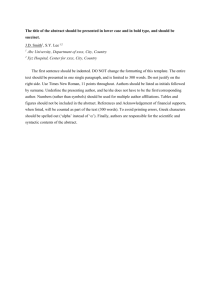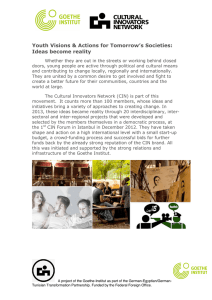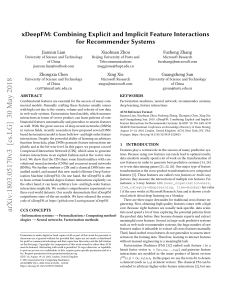slides
advertisement
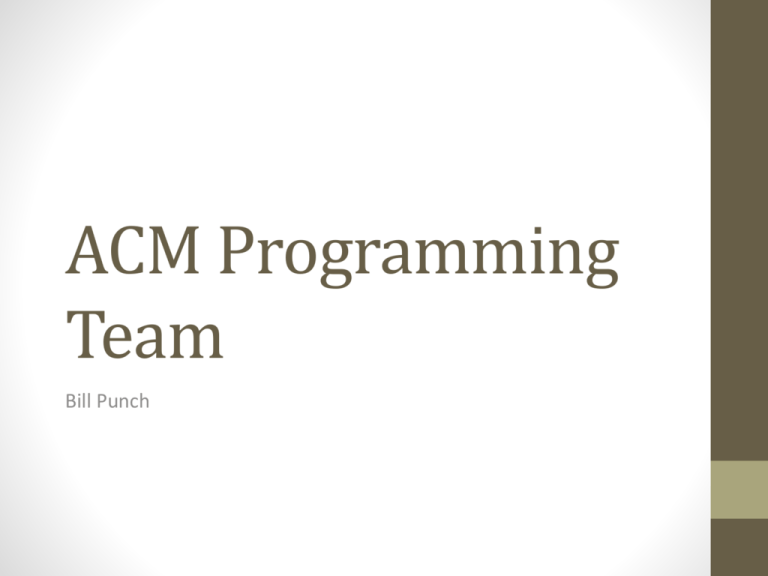
ACM Programming Team Bill Punch ACM Programming Contest • One of the premier programming competitions. • Held every year since 1977 • MSU was the winner that first year! • In 1992 MSU came in second (of the world competition), second to Melbourne • It is a tough competition and requires a lot of practice. You really have to be "into" this kind of thing to enjoy the effort that is required • That's why we are here, to practice The rules • Each "team" consists of three members • teams share a single computer during the contest • requires some coordination of effort (though less than you might think) • Each university can send at most three teams • Competition is done in two rounds: • first round is the regional competition • Our region is ECNA (East Central North America). You can find them at http://acm.ashland.edu/xxxx where xxxx is the year. No xxxx means the latest year • This is a tough region: UoM, Carnegie Mellon, Waterloo, Toronto more rules • The top two from each region can go onto the world competition (held in various lovely places, last year Orlando, 2012 is Warsaw Poland) • sometimes more than 2 can go from a region. Ours is a pretty good region • world competition determines the winner! Local Competition • We have to pick teams sometime in September/October. • selection of teams will be a competition held in the Fall • Our regional Final will be sometime in late October, probably at Grand Valley (last year it was Oct 21). • We will have some competitions during the course of this semester thanks to Charlie Andrews, using the ACM programming environment (more on that later). What we need to do is … • Get better at learning how to apply algorithms to the problems that come up. • Practice, individual practice, is probably the most important so we will do more of that this semester You can practice on your own • http://uva.onlinejudge.org • There are problems here of varying difficulty which you can submit and see how well you do • problems are numbered, we will be working off of these • you have to register to get onto this site, please do that. handin • as a way of keeping track who does what, I have created a handin site for all of us • this is prgtem (only allowed 6 letters) • you should all be registered, at least everyone who came previously and said they were interested • I will give out problems each week. • You submit them to handin before the next session • Voluntary for those not getting credit, mandatory for those with credit. Every week, before class • In the comments of each program, record your time (that is, keep time as to how long it took you to get a correct submission to the UVA judge). It is all about speed • This is a contest of speed. Comments, organization, OOP, none of that matters • Getting the right answer matters! • What counts as a right answer can be tricky! • the questions and the examples can look easy, but there are edge cases that can be difficult, time consuming • getting your program to run efficiently is often the problem. We must write efficient code! Scoring • Each team gets some number of problems to solve in 5 hours • 7 – 9 problems, word problems which can be hard to parse • The team that solves the most problems wins! • If multiple teams solve the same number of problems, then how long it took them breaks the tie (short times win) • Every mis-submission counts as 30 minutes against your time! • Just remember, the more problems you solve, the better. That is the winning strategy • Testing is done by an automatic judge (like UVA) that tests a broad number of cases • if you mess up, you can get one of a set of cryptic error messages saying what went wrong Languages • You can use one of 3 languages: C, C++, Java • We are a C++ shop so we will concentrate on that, but that is typically not the issue. Knowing the algorithm is the issue • none the less, familiarity with the language is helpful and we will talk about that early on. • If you have never programmed C++ before (or are just learning), you will have to work some to keep up. C++ I/O • All I/O for Acm programming contest problems is assumed to come from standard in and goes to standard out. No file manipulation is required • It is as if the problem were run as follows. Assume the name of the compiled program is a.out • ./a.out < input.txt • output is fed to the console and graded problem • Look at Volume1, problem 100 • remember the cin >> someInt will read in an integer from standard in • remember that cin.eof() is set to True when cin tries to read from an empty input problem Look at Volume 4, number 483 Couple of things there: • how to read in the line: getline(cin,line) • how to parse the line : string streams • how to reverse the line: reverse iterator is nice




